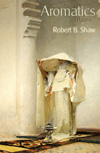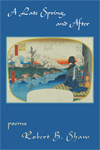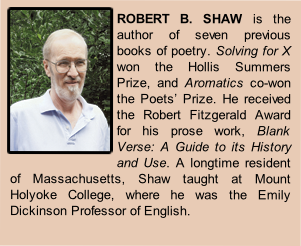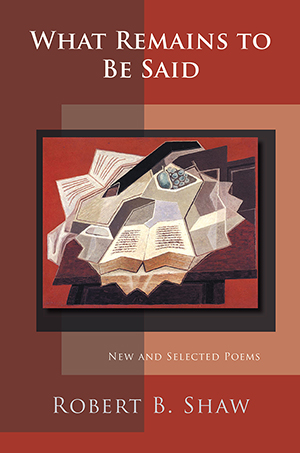Page last updated: October 24, 2022
All pages copyright © 2022 by Pinyon Publishing
WHAT REMAINS TO BE SAID
New and Selected Poems by Robert B. Shaw
What Remains to Be Said invites a sense of connectedness and gratitude. As in the
opening “Morning Song,” Shaw’s mastery of words also unbinds us from words, and we
enter the dark behind our eyes. Rhythmic tones carry us through place and time, with
cicadas, monarchs, the moon, the tree, a pulse, the key—as guides.
We enter Comforting the Wilderness (1977) with a dinner party, sensing the weaving
beginning like the rainbow dancing down the table. In A Late Spring, and After (2016),
we encounter “The shadow of a falling leaf” which “plummeted down the page I read,”
freed from the linear construct of time. Shaw gives us crayons to color memory impressions.
Ice time. Starfish to dispel linearity. Geode time, crystalline art.
With love, “the thumbprint plants a maze,” and perspectives scale from two to one
to zero. Fingering paths of waters, ferns, and goldenrods construct a trellis to
hold the fragility of life. Great and heavy themes emerge from the woods in our side
yards. In the glee of wild turkeys, we find solemnity. This seashell offering spirals
us in and out of words, giving life to our art and art to our life.
“In his new and selected poems, What Remains to Be Said, Robert B. Shaw gives us the full human range of his verse as he charts his life from gains to losses, joy to grief, with irony, wit, and compassion. From the masterful ‘The Post Office Murals Restored’ to the heartbreaking ‘The Loss of the Joy of Cooking,’ he shows how with changing circumstances and the gift of his talent the satirist can become an elegist. A key poem in the collection is ‘Lacrimae Rerum.’ There the poet meditates on a misreading of ‘tears’ rhyming with ‘fears’ and ‘tears’ rhyming with ‘cares.’ The emotional response of the tears of things, he understands, is brought forth by the physical damage of the tears in things. I have read and admired Shaw’s work for half a century and regard this volume, a gathering of poems from the 1970s to the present, as essential reading for anyone who cares about contemporary American poetry.”
—MARK JARMAN, author of The Heronry (poems) and Dailiness (essays)
 Aromatics (2011): The scents that permeate the poems of Aromatics include bittersweet
ones of memory, acrid ones of danger, and others equally enticing or alarming. Shaw's
scrutiny of the world’s inner mysteries is revealed in daily concerns and the self-reflection
and hope that accompanies it.
Aromatics (2011): The scents that permeate the poems of Aromatics include bittersweet
ones of memory, acrid ones of danger, and others equally enticing or alarming. Shaw's
scrutiny of the world’s inner mysteries is revealed in daily concerns and the self-reflection
and hope that accompanies it.
(6"x9" paperback, 100 pages, ISBN: 978-0-9821561-9-3, $15.00).
 A Late Spring, and After (2016): Shaw explores the depths of experience, childhood,
memory, and his midwestern roots. The heart of his book is a series of meditations
on his wife’s illness, passing, and what remains after—the vivid memories of time
well-spent.
A Late Spring, and After (2016): Shaw explores the depths of experience, childhood,
memory, and his midwestern roots. The heart of his book is a series of meditations
on his wife’s illness, passing, and what remains after—the vivid memories of time
well-spent.
(6"x9" paperback, 112 pages, ISBN: 978-1-936671-38-0, $16.00).
Spring, 2022: A Conversation with Robert B. Shaw, in Literary Matters—“Very early on, without thinking of the word “vocation,” I felt that what I was doing was different from a hobby or a pastime. I felt deeply compelled, not just to write, but to rewrite; to master expressive clarity and technical skills. It gave me, when it went well, a pleasure that was too serious to be called fun. I think I was a very odd teenager. … ” Read the Conversation, conducted by Ryan Wilson.
June, 2022: Book Review of What Remains to Be Said, in the Daily Hampshire Gazette—“These mostly free-verse poems cover a wide range of topics and also examine the span of the poet’s life … His voice is an engaging one, at times wry and plainspoken and sometimes more satiric and critical.” Read the Review, written by Steve Pferrer.
“He practices meter and storytelling with unaffected dexterity … ‘Morning Exercise’ illustrates another quality of Shaw’s poems. It gives us an immediate purchase on meaning — we can enjoy and understand it in a single reading — but it rewards closer attention as well. If we wish, we can take a deeper interpretative dive into it and note, for example, the deftness with which the poet develops the concept of doubling. … They’re intelligent and, at times, abstrusely original … Shaw writes, as do Dickinson and Robert Frost, in the faith that even nature’s humblest phenomena and organisms illuminate reality and merit investigation and contemplation.” Read the Review, written by Timothy Steele
“From Shaw’s debut and throughout his work, longer blank verse narratives (sometimes haunted with the mirroring longueurs of age and childhood, other times simmering with darker suggestions of desperation or violence) are leavened with shorter lyrics on the passage of time, and still lifes, sometimes playfully in the voice of the object or concept itself—whether it be a gargoyle, a bookmark, or a contagious yawn.” Read the Review



 Aromatics (2011): The scents that permeate the poems of Aromatics include bittersweet
ones of memory, acrid ones of danger, and others equally enticing or alarming. Shaw's
scrutiny of the world’s inner mysteries is revealed in daily concerns and the self-reflection
and hope that accompanies it.
Aromatics (2011): The scents that permeate the poems of Aromatics include bittersweet
ones of memory, acrid ones of danger, and others equally enticing or alarming. Shaw's
scrutiny of the world’s inner mysteries is revealed in daily concerns and the self-reflection
and hope that accompanies it. A Late Spring, and After (2016): Shaw explores the depths of experience, childhood,
memory, and his midwestern roots. The heart of his book is a series of meditations
on his wife’s illness, passing, and what remains after—the vivid memories of time
well-spent.
A Late Spring, and After (2016): Shaw explores the depths of experience, childhood,
memory, and his midwestern roots. The heart of his book is a series of meditations
on his wife’s illness, passing, and what remains after—the vivid memories of time
well-spent.